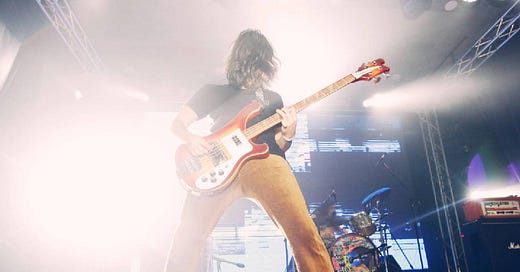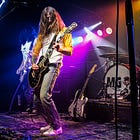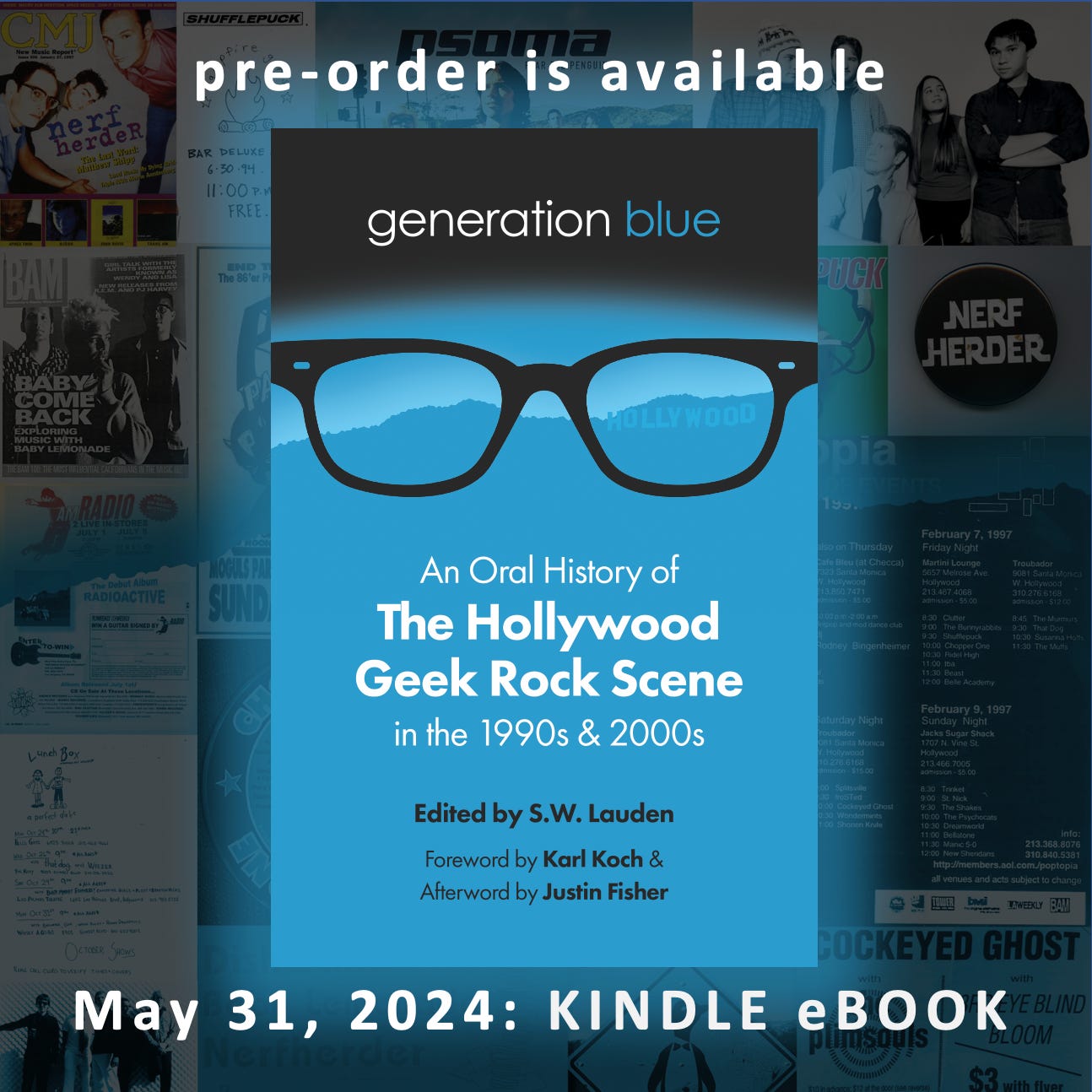Like many creative pursuits in the Digital Age, the classic model of bands recording new songs and touring widely in support of those releases has been turned on its head.
“We have been around for over thirty years. When we started out, a signed band would be expected to grind it out on the road even at a financial loss to get the word out to sell records,” said Chris Murphy, bassist/vocalist for Canadian guitar pop legends Sloan who still play venues ranging in size from clubs/theaters to summer festivals.
“Of course, a number of things have changed since those days, including the internet’s very existence, Napster/Limewire, and streaming services that don’t pay, so that nowadays records are essentially business cards given away as an excuse to make money on the road,” Murphy said.
What does that mean for newer acts trying to build a fanbase in the 2020s?
More artists are self-releasing music than ever before (which often means no tour support or promo beyond social media), or working with small-but-mighty indie labels that have limited resources. That was already true before COVID lockdowns brought the touring economy to a grinding halt in 2020, a blow that saw many clubs close.
Add to that the perennial pressures of day jobs, rent/mortgages, relationships/families, and mental health/wellbeing, and it’s perfectly understandable why many musicians choose to stay and play closer to home these days.
Indie touring was never easy, but it only seems to have gotten a harder in the past decade.
Despite the well-known challenges, more of the guitar pop bands that we write about at Remember The Lightning are hitting the road these days. So, I reached out to a few musicians to get their perspectives.
“It feels increasingly that the best way to introduce people to your music is the old fashioned way: get in a van and play shows in different cities,” said Keegan Bradford, guitarists for Camp Trash. The Florida-based band is about to embark on a summer tour starting June 15 in Bowling Green, Ohio.
And Camp Trash is not alone in that opinion.
Missouri’s The Whiffs regularly perform domestically and often tour Europe. The same is true for LA-based artists like Kate Clover or the collective of musicians that make up Uni Boys/Billy Tibbals Band. Richmond, Virginia’s Dazy has become a tour de force on club stages and the same is true of Philadelphia’s Hurry. LA power poppers The Reflectors recently toured Japan.
“I think it’s crucial to be a good live band,” Clover told me as she geared up for a European tour in support of their latest album, The Apocalypse Dream. “A lot of bands I know don’t want to tour because it’s too hard. It is hard, but I care about the show more than any hardship that comes with touring.”
At the same time, some acts sustain strong careers on the road. Daniel Romano’s Outfit is an unrelenting road act out of Canada, while New Zealand’s The Beths seemed to have circled the globe several times over the last couple of years. London’s Bad Nerves have earned a rabid international fanbase with a relentless touring across the U.K., U.S. and Europe.
“The only way you get better as a band is to play shows. Before a tour I love knowing I’ll have 30 shows ahead of me. Experience on stage can’t be replicated, you have to sweat it out,” Clover said.
Meanwhile, a growing group of bands from around the world including The Speedways (U.K.), Radio Days (Italy) and Paint Fumes (U.S.) make regular pilgrimages to Spain where the guitar pop fanbase has been consistent since the days when one-time rock and roll expats like Paul Collins and Kurt Baker called that country home.
“Promoters (in Spain) are still able to offer really good guarantees—and not just money, but providing meals and accommodations. You're not staying in a five-star hotel every night, you're staying in hostels and stuff, but you're sleeping in a nice bed. You're not on a floor or anything like that. And I know most bands that come here, they have the same experience. It’s just a welcoming country to tour in,” Baker told Allen Lulu for his article “Kurt Baker: The Spain Years” for Remember The Lightning—A Guitar Pop Journal, Volume 2.
The Lemon Twigs are touring Spain as I type this and their drummer, Reza Matin, will soon be returning with his band Uni Boys for shows in late June.
The list goes on and on.
All of that international activity bodes well for the future of hooky rock and roll because, at it’s core, this is music that is meant to be performed and experienced live.
And nothing inspires the next generation of live musicians to form bands and hit the road more than witnessing killer live sets as fans.
“I've always loved the full band aesthetic,” said Hannah Judge, singer/songwriter for Ottawa’s fanclubwallet. A successful bedroom pop artist who has traditionally written and recorded solo, Judge released the Our Bodies Paint Traffic Lines EP this year to celebrate her experiences playing with a live band.
“Our Bodies is actually just about touring; the whole EP is about being in a band too. It's about how we've been to all these new places we never thought we'd go and how much we've changed, and sort of just the idea that we're paving the roads of our lives with our music,” Judge told me an interview this March.
So, what’s the reason for this uptick in road activity?
“It’s a bit of a cliche at this point, but (touring) is really the only way most artists are able to make any money at all,” said Matt Scottoline, guitarist/vocalist for Hurry.
Money is definitely a motivating factor, especially since very few indie bands can make any kind of living off of traditional album sales or royalties from streaming platforms by staying home—but touring paydays aren’t a given. (It’s worth noting that many of the musicians interviewed for this article were reluctant to describe their music or touring as a “career.”)
With minimal guarantees from promoters/bookers and considerable overhead, many indie acts subsist on T-shirt and LP/CD sales. Even slots opening for established bands are often more about increased exposure, which is very important for up-and-comers but doesn’t necessarily mean they’ll be flush with cash when the tour ends.
“We are a small band, so we are always an opening band for other tours. Frankly this means that we make $150-$250 a night for performing music, most of which goes back into the gas tank, van repairs, merch printing costs, and hotels on the nights we can't find a place to crash. The only ‘profit’ our band has every seen is from merch sales,” Bradford said.
Beyond the money, many artists also tour because they love playing live and meeting people who support their band.
“Touring is really important! We approach playing live very differently to the way we work in the studio. On stage we're very 'bang, bang, bang'—songs joined together and no time to catch a breath, until we do a tearjerker and then we pace it a little differently,” said Matt Julian, guitarist/vocalist for The Speedways.
The London-based quartet has performed in 10 countries to date—including a short East Coast U.S. run with The Whiffs last year—and Julian points to the growing audiences in cities they’ve played multiple times as proof that touring still pays off.
For Julian, the best parts of touring are the personal memories it delivers for him and his bandmates including exploring new places, sampling local cuisine, and connecting with people in different parts of the world through music.
“We've had some great nights out in New York, Paris, Hamburg, Madrid, Barcelona, Brussels and Benidorm. They're always the favorite experiences that stay with you,” Julian said, adding: “Mankind lives a pretty horrible internet existence these days. Nothing beats putting your coat on and going out to see for yourself.”
“Hurry recently did a UK tour with our Scottish label-mates U.S. Highball and it was just a surreally beautiful experience,” Scottoline said.
“The countryside, the people, the shows—everything was ideal, and touring with a band from the continent allowed us to meet so many people and build our own community there. The highlight would have been the show in Glasgow where we not only got to chat with Stephen Pastel a bit at his record shop Monorail, but we were joined at the show by Gerry Love of Teenage Fanclub who also performed a song with us. Just a dreamy experience.”
It’s those connections that ultimately make touring worthwhile for Scottoline. After years spent on the road in various bands, he has built a community of likeminded acquaintances including other musicians and venue staff that he says can be familial and comforting when far from home and performing night after night.
“After spending so much time in the weeds of writing, recording, entering the whirlwind of PR and marketing, and whatever else comes with releasing music, being able to get on stage and perform for real people often is what solidifies the experience of it all and makes it feel complete,” Scottoline said.
“At the end of the day, performing songs you wrote is really why most of us started doing this. That’s the essence of it all.”
It’s a thrill that sustains many artists, even after decades of live performances all around the world.
“I like going on tour and I like coming home. I also like writing and recording. I like making artwork and promotional materials. It’s all fun. We know how lucky we are to be able to still do it. It’s not lost on us that there are a lot of talented people out there that couldn’t get a break,” Sloan’s Murphy said.
“I feel like there are still people coming out of the woodwork who had either neither heard of us or never given us a fair shake and they are only now hearing our thirteen studio LPs (and the stuff on top of that) and are excited to dig in,” Murphy said.
“A guy in my fifties in a band working on its fourteenth LP? Pretty cool for me.”
Pretty cool for fans of great guitar pop too.
Should I Turn This Into A Series? Leave A Comment If You Liked It.
Some Related Articles:
The Kindle edition of Generation Blue: An Oral History of The Hollywood Geek Rock Scene in the 1990s & 2000s is now available. This book was previously only available in print and sold with a vinyl compilation. Geek Rockers can now read all the personal stories and stream the comp on Bandcamp, Spotify, Apple Music, etc.











Enjoyed the piece, but love the breaking news that Sloan is working on their next album.
We see many of these bands in the fall and winter in the US it seems. The festival and summer scene seems less developed here, so we see bands swing through once the season passes. Will be seeing DIIV soon, they’ll probably be the summer highlight for me.
Thanks for providing the band recommendations - always looking for new (to me) acts.